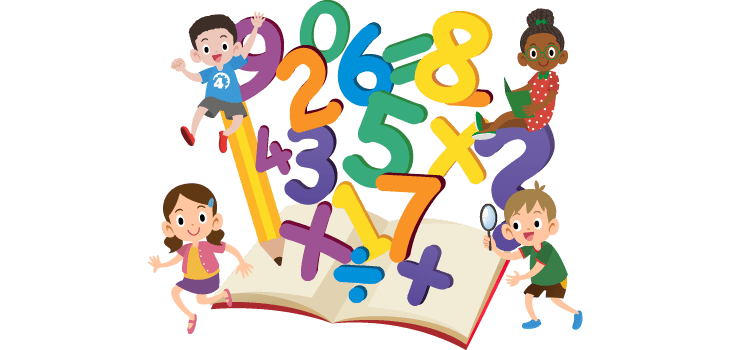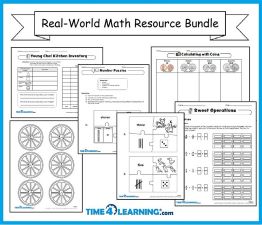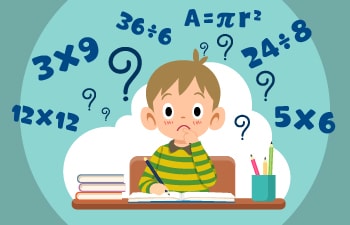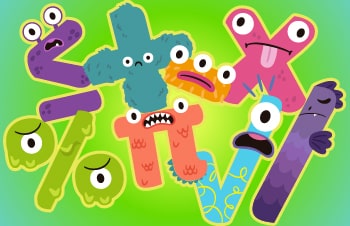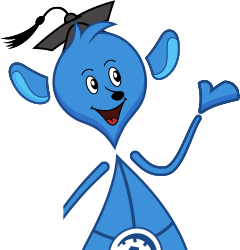Incorporating real-world connections into elementary math education is a powerful way to make learning more engaging and meaningful. By using everyday examples, such as cooking or money, students can see how math applies to their daily lives. Math games, technology, art and even books can also be valuable tools to foster a lifelong appreciation for math. Here are some hands-on activities to help bring math concepts to life.
Using the Kitchen for Building Math Skills
Kindergarten Through 2nd Grade Activities
Letting your younger student help in the kitchen offers many fun learning opportunities for practicing math skills. Younger elementary students can help by counting, adding, or subtracting ingredients for a recipe. They can also practice math skills by sorting kitchen tools and pantry items by their shapes or sizes.
3rd Through 5th Grade Activities
Older elementary students can practice adding or multiplying fractions. For example, they could compute measurement conversions by finding how many tablespoons equal one ounce. They can also determine how many ½ cups equal 3 whole cups. For an extra challenge, ask your student to determine how much of each ingredient is needed to double or even triple a recipe!
Following strict directions and sequencing are also important when cooking. These skills help students with math by incorporating problem solving, logic, and order of operations. Using these steps is fun, and the best part is, you may create a culinary treat to enjoy together!
Using Money to Reinforce Math Skills
Kindergarten Through 2nd Grade Activities
Money is a great tool to get students interested in math. You can practice sorting, counting, and arithmetic using real, physical money or pretend bills and coins. Have students sort the coins and quiz them on how much each coin is worth. Practice skip counting (counting by intervals other than 1, like 2, 5, or 10) to find the totals. Allow students to make comparisons of money combinations, determining which combinations represent larger amounts and which represent smaller amounts of money.
You can use bills and coins to create addition, subtraction, and multiplication problems. For instance, “If it takes four quarters to equal one dollar, how many quarters will equal six dollars?” You can also create spending scenarios like, “You have 2 quarters, 2 dimes, 5 nickels, and 5 pennies. You want to buy an item that costs $1.05. Do you have enough money to buy the item? If not, how much more do you need? How could you make the needed amount with coins?”
3rd Through 5th Grade Activities
This is the perfect time to start building financial literacy skills while using math and money. Teach students to budget, or have them pay for products at the store and count out the change. Make a grocery list and budget a certain amount for groceries. You could bring a calculator to the store and have students add up the prices as you shop. Teach students about comparison shopping. For example, “The cost of a product is $3.99, but a similar product is on sale for $2.49. If you buy the sale item, how much money will you save?”
Use Stories to Teach Math
Stories are great tools to help students build connections to math by providing context for their learning. Check out this book list featuring stories focused on math!
|
|
Hands-on Math Lessons
Kindergarten through 2nd grade activities
Encourage student engagement with simple, hands-on activities. For example, use bingo chips, candies, Legos, or other objects as “counters” to help students visualize abstract concepts. Instead of writing 3 – 2 =1 on a white board, use the counters to explain the same concept.
Play math bingo or math checkers to practice math facts or more challenging math concepts. Or solve number puzzles to learn different representations of numbers. There are many ways to make math fun while helping students make math concepts stick!
3rd through 5th grade activities
There are many math games available such as Fraction Puzzles, Divide and Conquer, and more. You can have students convert fractions into decimals by playing bingo, or make equivalent fractions through edible activities like candy bar fractions. Another idea is to create flipbooks to practice math concepts. Board games are also fantastic hands-on resources for helping students with math at home. For example, Yahtzee teaches addition and subtraction skills and Rummikub reinforces skills such as addition, sequencing, and patterns. Use your imagination and your kids will respond positively, especially when they’re solving math problems in a fun setting.
Free Elementary Math Worksheets
Download our elementary math printables bundle, which includes hands-on number puzzles, flipbooks, and fraction activities!
Online Math Resources
While there are many online games available, a lot of them are full of potentially dangerous ads and are not age-appropriate for elementary school students. But Time4MathFacts educational games are ad-free and age-appropriate! These math games are entertaining and excellent at keeping students engaged. And the longer your kids are engaged and practicing their math, the better chance they’ll have at mastering math fact fluency.
For a more structured program, try a skill-building tool like Time4Learning’s elementary math curriculum. Students can review difficult concepts to help them practice and understand. These lessons not only teach students how to “do” math, but also include deeper conceptual elements to help them understand the “why.” This method builds a stronger math foundation and prepares students for later complex concepts and problem solving.
These fun math tips for elementary students will allow them to practice math concepts as they progress through their learning. Using suggestions such as these should also make your job less stressful while you teach math concepts using activities and resources that are not only engaging for you and your child, but also easily accessible. And let’s not forget about the entertainment value — it’s a win/win when your kids are learning math and having fun!
Learn more tricks and strategies to support students struggling in math!

